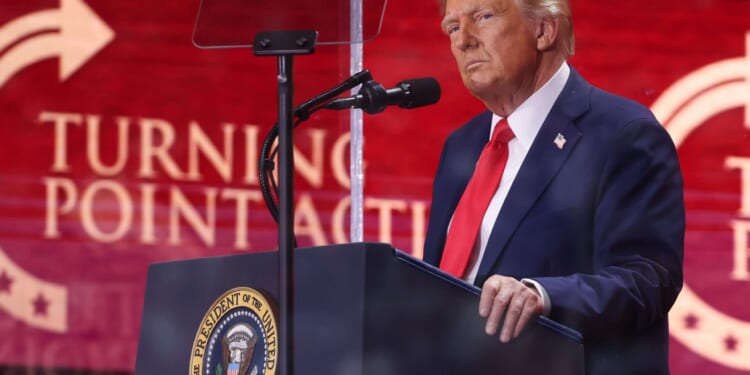At the Arizona memorial service for Charlie Kirk, who was assassinated two weeks ago, President Donald Trump acknowledged Kirk’s character, saying, “he did not hate his opponents; he wanted the best for them.” And then he added, “That’s where I disagreed with Charlie. I hate my opponents. And I don’t want the best for them.”
It was an honest moment if an awkward comment to make at a memorial service for a man murdered (to all appearances) by a political opponent. Like too much of the political class across the ideological spectrum, Trump is prone to despising those he disagrees with. It raises questions about why people should ever submit to the governance of those who hate them—and whether politicians realize that they’re a big part of what brought us to this unfortunate moment.
You are reading The Rattler from J.D. Tuccille and Reason. Get more of J.D.’s commentary on government overreach and threats to everyday liberty.
“It’s long past time for all Americans and the media to confront the fact that violence and murder are the tragic consequence of demonizing those with whom you disagree,” Trump had told the nation on the day of Kirk’s assassination at a kinder and, perhaps, more self-aware moment. “This kind of rhetoric is directly responsible for the terrorism that we’re seeing in our country today.”
In truth, that day Trump also put the blame for Kirk’s murder on “the radical left” and promised to “find each and every one of those who contributed to this atrocity and to other political violence,” hinting at something nastier than a criminal investigation. But for a moment, the president seemed to recognize that hating political opponents and wishing them ill might have unhappy consequences. For a moment.
Trump isn’t alone in the political class when it comes to villainizing those who disagree or treating them as aliens in their own country and unworthy of respect. In a bizarre address to the nation in 2022, then-President Joe Biden lectured the country that “MAGA Republicans do not respect the Constitution” and “fan the flames of political violence.”
By that time, Biden had already accused his opponents of “semi-fascism.”
Kamala Harris, Biden’s unsuccessful successor as Democratic standard bearer in the 2024 presidential race, dropped the “semi” and went with “fascist” to describe her opponent.
That wasn’t the beginning of the dismissal of half the country by politicians courting the other half. Trump and his allies regularly accuse their opponents of anti-Americanism—”I really believe they hate our country,” Trump said in July. Trump’s 2016 Democratic opponent, Hillary Clinton, dismissed her foes as belonging in a “basket of deplorables” characterized as “racist, sexist, homophobic, xenophobic, Islamaphobic—you name it.” And, as a presidential candidate in 2008, Barack Obama sniffed at small-town dwellers as “bitter, they cling to guns or religion or antipathy to people who aren’t like them.”
The result is that no matter which of the big political parties wins national office, around half the people over whom the victors exercise power know they’re governed by people who hate them – and they return the favor.
“I think that is something to be fearful of, the normalization of what can devolve into dehumanizing, inciting rhetoric,” James Druckman, a professor of political science and co-author of Partisan Hostility and American Democracy: Explaining Political Divisions and When They Matter, commented last year. “It has consequences for what people think of other groups. It has consequences for what people think of democracy.”
In terms of what Americans think of each other, we already know partisan hostility is intensifying.
“About three-quarters (73 percent) of voters who identify themselves as Republican agree that ‘Democrats are generally bullies who want to impose their political beliefs on those who disagree,'” a poll by the University of Chicago’s Institute of Politics found in 2022. “An almost identical percentage of Democrats (74 percent) express that view of Republicans.”
In summarizing YouGov polls, Eli McKown-Dawson noted last year that “Democrats and Republicans are increasingly likely to dislike each other and to feel hostile toward members of the other political party.” Specifically, “85% of Democrats have an unfavorable opinion of the Republican Party, an increase of 16 percentage points since February 2023. The share of Republicans who view the Democratic Party unfavorably rose by a similar amount: 88% of Republicans feel unfavorably toward the Democratic Party, compared to 74% last year.”
Maybe it was inevitable that a political culture that has normalized “demonizing those with whom you disagree,” as Trump put it in the day of Kirk’s murder, would turn to force to settle disputes. That’s meant vandalism, arson, vehicle attacks, attempted assassinations, and murders, such as those of Yaron Lischinsky, Sarah Milgrim, Brian Thompson, Melissa Hortman, and Charlie Kirk.
This is insane, and it’s dangerous. Americans—people in general—should not be subject to the whims of those who despise them. We deserve better than to be governed by those who disdain what we believe and how we live. This is a big enough country that there’s no need to live at daggers-drawn alongside people whose values and preferences are so different they’d rather fight than find common ground.
For years, Americans have been moving to live in neighborhoods where they feel politically comfortable. “Our analysis suggests partisanship itself, intentional or not, plays a powerful role when Americans uproot and find a new home,” Ronda Kaysen and Ethan Singer wrote last year for The New York Times in a piece on Americans’ moving patterns. “In all but three states that voted for Mr. Biden in 2020, more Democrats have moved in than Republicans. The reverse is true for states Mr. Trump won.”
Rather than seethe at “deplorables” or those who “hate our country,” and instead of fighting with opponents for a brief opportunity to force policies on the unwilling before they do the same in return, perhaps our political class could turn their attention to those localities dominated by people willing to buy what they’re selling. They could leave the rest of us alone to live by different rules. That was, after all, how our federal system was designed to work—as separate experiments in laws and governance.
At Kirk’s memorial, Erika Kirk, Charlie’s widow, had a different message than that of Trump. “That young man,” she said of her husband’s assassin, “I forgive him.
That’s a kinder sentiment than I could summon in such circumstances. But nobody would be asked to extend such forgiveness if members of the political class could keep their loathing for people who disagree with them unvoiced and confine themselves to inflicting their views on willing followers.

















